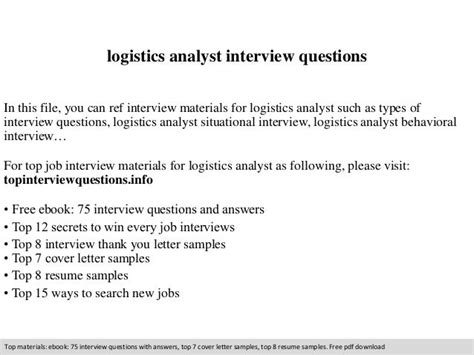A logistics analyst is a professional who designs, implements, and manages the flow of goods, information, and services from the point of origin to the point of consumption. They work with businesses of all sizes to optimize their supply chains, reduce costs, and improve customer service.

What Do Logistics Analysts Do?
Logistics analysts perform a wide range of tasks, including:
- Analyzing and forecasting demand for products and services
- Designing and implementing logistics networks to optimize the flow of goods and information
- Selecting and managing transportation providers
- Negotiating rates and contracts with suppliers and carriers
- Tracking and monitoring shipments to ensure timely delivery
- Managing inventory levels to avoid shortages or surpluses
- Providing customer service and resolving any issues that arise during the shipping process
What Skills Do Logistics Analysts Need?
Logistics analysts need a strong understanding of the following:
- Logistics principles and practices
- Supply chain management
- Transportation management
- Inventory management
- Customer service
- Data analysis
- Problem-solving
- Communication
- Teamwork
What is the Job Outlook for Logistics Analysts?
The job outlook for logistics analysts is expected to be good over the next few years. The growth of e-commerce and the increasing complexity of global supply chains are driving demand for these professionals. According to the U.S. Bureau of Labor Statistics, the median annual salary for logistics analysts was $74,630 in May 2020. The top 10% of earners made more than $122,570, while the bottom 10% earned less than $43,780.
How to Become a Logistics Analyst
There are several ways to become a logistics analyst. The most common path is to earn a bachelor’s degree in logistics, supply chain management, or a related field. However, some employers may also hire candidates with experience in other fields, such as transportation, manufacturing, or customer service.
In addition to a formal education, logistics analysts typically need to have several years of experience in the field. This experience can be gained through internships, entry-level positions, or military service.
What are the Benefits of Hiring a Logistics Analyst?
There are many benefits to hiring a logistics analyst, including:
- Reduced costs: Logistics analysts can help businesses save money by optimizing their supply chains and negotiating better rates with suppliers and carriers.
- Improved efficiency: Logistics analysts can help businesses improve efficiency by streamlining their operations and reducing lead times.
- Increased customer satisfaction: Logistics analysts can help businesses increase customer satisfaction by ensuring that products and services are delivered on time and in good condition.
- Competitive advantage: Logistics analysts can help businesses gain a competitive advantage by providing them with the insights they need to make better decisions about their supply chains.
Logistics analysts are essential members of the supply chain management team. They play a vital role in helping businesses optimize their operations, reduce costs, and improve customer service. If you are looking for a challenging and rewarding career, then logistics analysis may be the perfect fit for you.
What is the difference between a logistics analyst and a supply chain manager?
Logistics analysts focus on the day-to-day operations of the supply chain, while supply chain managers have a more strategic role. Supply chain managers are responsible for developing and implementing long-term plans for the supply chain, while logistics analysts are responsible for ensuring that the day-to-day operations of the supply chain are efficient and effective.
What is the best way to prepare for a career as a logistics analyst?
The best way to prepare for a career as a logistics analyst is to earn a bachelor’s degree in logistics, supply chain management, or a related field. You can also gain experience in the field through internships, entry-level positions, or military service.
What are the biggest challenges facing logistics analysts today?
The biggest challenges facing logistics analysts today include:
- The increasing complexity of global supply chains
- The growth of e-commerce
- The need to reduce costs
- The need to improve customer service
What is the future of logistics analysis?
The future of logistics analysis is bright. The growth of e-commerce and the increasing complexity of global supply chains are driving demand for logistics analysts. In the future, logistics analysts will play an even more important role in helping businesses optimize their supply chains and improve customer service.












